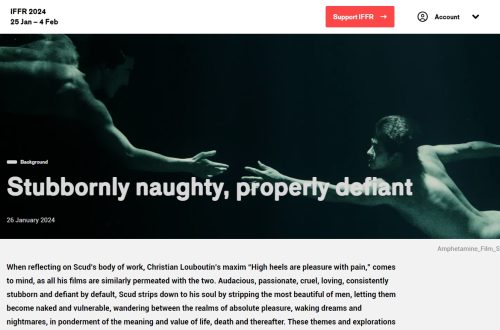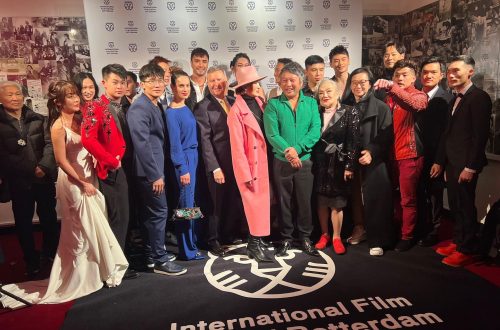Exploring Love, Death, and Identity in SCUD’s Films: Insights from the International Film Festival Rotterdam
SCUD at the International Film Festival Rotterdam. In this exclusive talk, SCUD explores the profound themes that permeate his work, including love, death, and identity. From his early films like “City Without Baseball” and “Permanent Residence” to his latest projects, SCUD shares insights into his creative process, the challenges of depicting complex relationships, and the impact of cultural conservatism on artistic expression. Discover how his personal experiences influence his storytelling and how the exploration of mortality has shaped his cinematic journey. This talk is a must-watch for fans of queer cinema, Hong Kong film, and anyone interested in the profound connections between art and life.
Victor Fan: Welcome to the 53rd International Film Festival Rotterdam. Today, we celebrate the work and life of Hong Kong filmmaker SCUD, whose career began over 15 years ago. Unfortunately, this year, he announced his retirement. We hope to convince him to reconsider as he is truly a pride of Hong Kong Cinema and queer Cinema. Let’s welcome SCUD to the stage!
[Applause]
Victor Fan: Thank you for being here today. The format for our discussion will be for the first hour to hour and fifteen minutes, we will chat together, and then we’ll open the floor for audience questions. I want to explore four recurring Buddhist ideas in SCUD’s cinema: birth, aging, illness, and death. However, this is not meant to confine our conversation, as SCUD’s films are multi-dimensional.
Victor Fan: In your film “Permanent Residence,” you humorously address an impression audiences have had when watching your films. Early in your career, there’s a noticeable representation of beautiful, athletic, and youthful bodies, which brings a sense of joy.
SCUD: Yes, that initial reception of my work got me into some trouble, as I was labeled a filmmaker who merely sought to exploit beauty for monetary gain. I shot the scenes in a locker room setting, and while it was intended to be artistic, Hong Kong had grown conservative. I realized that showing male bodies became a controversial aspect of my work.
Victor Fan: The camera’s relationship with these bodies seems intimate yet distant. How do you negotiate that relationship?
SCUD: I like to admire beautiful things from a distance without ever really touching them. It reflects a more common human experience of admiration for beauty without direct ownership or access.
Victor Fan: Your films often portray intimate yet distant romantic relationships. To what extent do these stories draw from personal experience?
SCUD: “City Without Baseball” tells the story of the baseballers, with about 90% realism. “Permanent Residence” is more personal, so perhaps 60% parallels my life experiences. As I’ve progressed, I’ve moved towards more imaginary narratives.
Victor Fan: You’re known for tackling heavy themes, such as the depiction of violence. In “Amphetamine,” the portrayal of sexual assault is poignant. How was it to direct that scene?
SCUD: Directing that scene was challenging. The emotional weight was immense, and I was unprepared for how powerful it would be. I ended up stepping away, overwhelmed by the intensity of the scene.
Victor Fan: You’ve often used the theme of death in your films. Can you elaborate on your contemplation of death throughout your work?
SCUD: Death is a significant theme for me. I’ve contemplated it since childhood and lost loved ones like my grandmother. I feel compelled to communicate about death, which I explore through film. With each film, I seek deeper understanding.
Victor Fan: You’ve expressed a desire to retire but recognize the ongoing creative force within you. What are your thoughts on maintaining this decision?
SCUD: Retirement is tough for a creative. I’m not leaving the art form entirely. While I might not direct new films, I’ll still write and engage with cinema in other ways.
Audience Questions:
Q: Some viewers find the portrayal of femicide in your film “Love Actually… Sucks!” problematic. What is your stance on this depiction?
SCUD: I do not condone violence against anyone and tell stories grounded in reality. My work reflects real scenarios and the darker sides of love, not glorifying them.
Q: Who is your ideal audience for your films?
SCUD: Any audience that seeks out my films is valid. Critiques from those who have actually watched my work are welcome, but I dislike when people criticize without understanding my films.
Q: How can you make a decision to retire in such a creative field?
SCUD: The motivation to create diminishes as I strive to exceed my previous work. Financial realities also play a role. I’ll continue to engage creatively, whether through writing or other avenues.
Q: How do you see the future of cinema, especially concerning your unique style?
SCUD: The world feels increasingly consumed by commercialism, and I’ve felt like an outsider for much of my career. While I take pride in my work, I’m unsure of the future of my specific genre as audiences may be less inclined to engage with challenging content.
Victor Fan: Thank you, SCUD, for your insights and for sharing your journey with us. Thank you to all the actors, crew, and everyone involved in this event.
[Applause]





